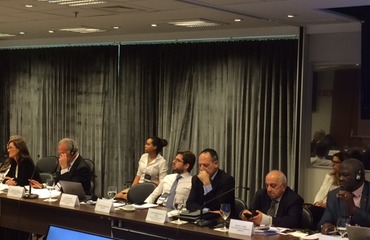São Paulo – Morocco could be a key ally of Brazil’s in exporting goods to the entire African continent. Prospects for exploring the African country as a gateway to Africa were discussed in the seminar Assessing and Redefining Policies towards Africa in a New Global Scenario: Intersecting Perspectives between Brazil and Morocco, held by Rio de Janeiro-based think tank the Centre for Studies in Integration and Development (CINDES), by Morocco’s OCP Policy Center this Monday (17), by the Brazilian Center for International Relations (CEBRI) and by the National Federation of Industry (CNI) in São Paulo.
Michel Alaby, CEO of the Arab Brazilian Chamber of Commerce, was one of the speakers in the panel Morocco-Brazil economic relations: current situation and intersecting perspectives for further cooperation with Africa, which was moderated by Arab Chamber president Rubens Hannun. Alaby cited figures from Brazil-Morocco trade and gave suggestions for increasing trade flows.
Brazil-Morocco trade had been shrinking for the past few years, but bounced back in the first half of this year, with imports to Brazil reaching USD 382 million, up from USD 255 in H1 2016, while exports from Brazil to Morocco soared from USD 203 million to USD 313 million.
But Alaby stressed that sales revolve mostly around two products: “Fertilizers make up more than 70% of sales from Morocco to Brazil, while sales from Brazil to Morocco are mostly sugar,” the Arab Chamber CEO said.
As options for increasing trade flows and broadening the range of goods sold from both countries, Alaby suggested trips by business delegations, having executives join industry shows, and reducing paperwork requirements, especially in agriculture and livestock farming, as well as advancing faster towards a Mercosur-Morocco trade agreement.
“We need to leverage economic relations between our countries. Morocco isn’t just a key hub when it comes to Africa, but to all Arab countries as well,” he said.
According to Abdou Diop, president of the South-South Commission of Africa and of the General Confederation of Moroccan Enterprises (GCME), Morocco is the right country to bridge the gap between Brazil and other African markets. He mentioned Moroccan private sector players which are active in other countries, including banks, insurers and Morocco’s airline Royal Air Maroc: “It flies to 35 different cities in Africa,” he said.
Right now, according to Diop, Moroccan enterprises are rolling out infrastructure projects in countries including the Ivory Coast, Madagascar, South Sudan and Ehtiopia, and Brazil could join up to provide technological knowledge. “In Ethiopia, sugarcane is key, and Brazil could collaborate in the energy industry,” he asserted.
As for manufacturing integration opportunities, he mentioned the auto and aerospace industries, as well as prospective joint ventures between Brazilian and Moroccan companies. “Moroccan enterprises have secured a foothold in Africa, and they can help Brazilian companies compete there,” he claimed.
An International Relations professor at Fundação Armando Álvares Penteado (FAAP), Marcus Vinicius de Freitas went over aspects of Brazil-Morocco relations that need improving, such as transportation costs, government incentives that give certain industries a head start to the detriment of others, and overly complex labor laws. He believes that both Brazil and Morocco could benefit from less state interference in the private sector.
Cindes director Sandra Rios also discussed the lack of variety in trade and touched on other industries that hold promise to both sides: besides the abovementioned auto and aerospace industries, she said Morocco could export clothing, footwear, electronic components and fish to Brazil, whereas Brazil might be selling ores, steel, chemicals, pharmaceuticals and industrial machinery to Morocco.
At the end of the panel, the Arab Brazilian Chamber president said he took note of all relevant information and that the Chamber is fully available to help bring the suggestions to fruition.
*Translated by Gabriel Pomerancblum




